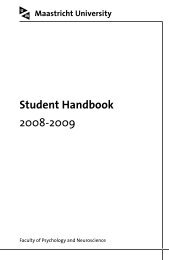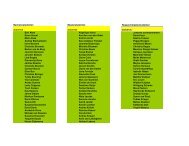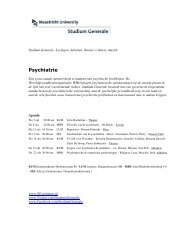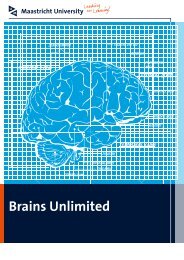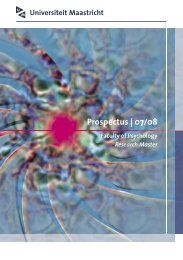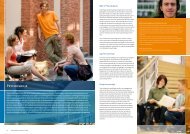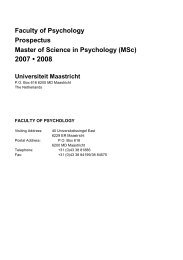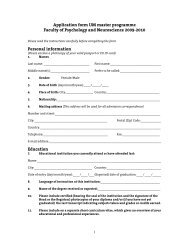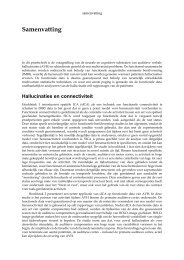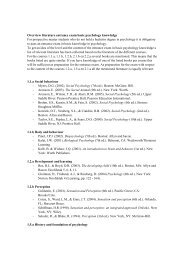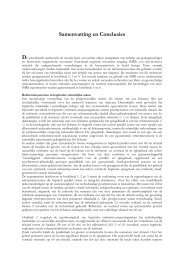Prospectus | 08/09 - Psychology and Neuroscience - Maastricht ...
Prospectus | 08/09 - Psychology and Neuroscience - Maastricht ...
Prospectus | 08/09 - Psychology and Neuroscience - Maastricht ...
You also want an ePaper? Increase the reach of your titles
YUMPU automatically turns print PDFs into web optimized ePapers that Google loves.
Chapter 5 - Specialization Psychopathology<br />
therapy, 3) applying exposure, 4) explaining the rationale of cognitive therapy <strong>and</strong> 5)<br />
applying cognitive techniques. After this training students should be able to carry out<br />
some elementary therapeutic procedures.<br />
Literature<br />
Roth Ledley, D., Marx, B.P., & Heimberg, R.G. (2005). Making cognitive-behavioural therapy<br />
work. New York: The Guilford Press.<br />
Instructional Approach<br />
Four 3-hour sessions. In this training demonstrations <strong>and</strong> role-play will be used. Each<br />
of the students will ‘treat’ one case, which is role-played by another student. The<br />
students apply the different techniques on this role-played case. First the instructor<br />
demonstrates each of the techniques. Subsequently, each of the students will apply<br />
these techniques on his/her role-played case. Last, students write out a verbatim<br />
of each of the therapy sessions. This verbatim will be used as the assessment of<br />
this course. Next to treating their role-played case, student will apply some of the<br />
techniques on their own mild fears.<br />
1<strong>09</strong><br />
Form of Assessment<br />
The coordinator will grade the individual verbatim of the therapy sessions.<br />
5.4 M&T workshop<br />
| 491PP Ecological Psychiatry – 1 credit<br />
Coordinator: Philippe Delespaul, Psychiatry & Neuropsychology (FHML),<br />
Phone 36 88685, Vijverdal, Room: SN2.069, E-mail:ph.delespaul@sp.unimaas.nl<br />
Description of the Course<br />
The expression of psychiatric symptoms is reflected in an individual’s behaviours <strong>and</strong><br />
private phenomena such as thoughts, perceptions <strong>and</strong> emotions. Psychiatric deficits<br />
reveal themselves in the ongoing interplay between the patient <strong>and</strong> the everyday<br />
environment, unavailable for direct observations by the clinician. Therefore, crucial<br />
diagnostic information has to come from recollections y the patients. Unfortunately,<br />
these self-observations are not reliable. To ascertain reliable data, self-ratings should be<br />
collected prospectively in the normal daily life of subjects (‘ecological validity’).<br />
The aim of the workshop is:<br />
• to introduce the field of ecological psychiatry with its scientific roots.<br />
• to discuss the methodological <strong>and</strong> statistical challenges related to research with selfreports<br />
in normal living situations.<br />
• to illustrate the applicability of these research methodologies in basic <strong>and</strong> applied<br />
clinical research (using schizophrenia research as the primary reference).



